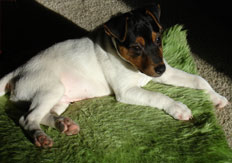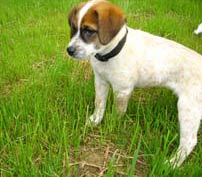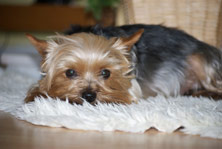|
Puppy Potty TrainingPuppy potty training is likely the first step that you will do with your dog, other trainings are optional but you can't avoid house training a puppy. And even though it is one of the first steps in your training, it may also give you the biggest headache. Your reaction is what counts. There are a few simple rules that you need to follow to prevent your puppy from littering in the house. Watch for the symptoms:
TIP: Remember that puppies younger than 12 weeks can’t physically control themselves yet. Puppy crate training is a great option. This will allow your puppy to have his own safe place and will prevent him from roaming unsupervised, in the house. The more that your puppy spends unsupervised in the house, the more often that he will make a mistake and your puppy potty training will end up being much more demanding. The second rule is to establish a pattern. Establishing a pattern will allow your puppy to start timing his potty needs. Normally puppies need to go potty after they eat, sleep and exercise. I would recommend taking your puppy out every 2 hours if the puppy is not sleeping, of course. TIP: On average, puppies need to relieve themselves 6-8 times per day. Once you are out, your goal is to encourage your puppy’s good behavior by rewarding him every time he relieves himself in the correct location. Use a command like “go potty” and praise him a lot when he does his business. This is a very important step towards house training a puppy. It will also help your puppy to eventually connect the voice command with the action and the location. TIP: It is also recommended to always use the same place for his potty, your puppy will recognize the smell of it and that will encourage him to go there. Once your puppy has done his potty outside it is time to play or you can show him the house and let him If you notice that your puppy starts to potty in the house, don’t create a panic; don’t run or do anything that may scare him. You can show him that you are not satisfied with that action by the use of signal like “No” or something along those lines. A lot of people will run and pick up the puppy to take him out. Although picking up the puppy may temporarily delay his potty until you get out of the house, all of the commotion created and the fast actions may leave your puppy shocked. He will probably not connect why he was taken out and to him this would become a negative experience based on a no-reason action. This may result in a fear and a lack of trust in family members if this happens often, and of course it will delay your puppy potty training. If it happens that your puppy litters in the house, clean it, but avoid the use of any solutions or cleaners that contain ammonia. This will only increase the intensity of the smell and may be an invitation for your puppy the next time. Correcting or punishing your puppy for an accident in the house is useless and it won’t change anything. Remember that puppies have difficulty physically holding themselves back when they are young, and punishing them will just create fear in your puppy and he may lose his trust in you. Housebreaking a puppy requires patience. Now what about if you are living in a city for example, in a skyscraper and your apartment is located on the 14th floor or above?
Remember to praise your dog when doing it right, use a verbal command in your puppy potty training so that your puppy can learn to associate it with the good behavior that you want. You can then move on with your puppy training. The next step is puppy crate training. Return from Puppy Potty Training to Puppy Training
|





 The first rule should be to limit your puppy’s freedom in the house; this is not punishing or confining in a negative sense. If you allow your puppy to freely roam your house, he will find a spot to litter anywhere; there are simply too many possibilities.
The first rule should be to limit your puppy’s freedom in the house; this is not punishing or confining in a negative sense. If you allow your puppy to freely roam your house, he will find a spot to litter anywhere; there are simply too many possibilities.  get familiar with the area. But of course this has to be supervised.
get familiar with the area. But of course this has to be supervised. You can paper train your dog. Simply choose the place in the apartment that your puppy can use for his potty (this place has to always be accessible to the puppy) and put old newspapers down in a few layers. Place your puppy in the area and stay with him (you can play, etc...) until he finally does his potty there. Once he is done, clean the area but leave one wet piece under the clean newspaper so that it contains the smell. Normally, puppies will learn that this is the place to use in no time. Of course, limit your puppy’s radius of walking unsupervised in the house in order to stop him from finding other places to litter elsewhere.
You can paper train your dog. Simply choose the place in the apartment that your puppy can use for his potty (this place has to always be accessible to the puppy) and put old newspapers down in a few layers. Place your puppy in the area and stay with him (you can play, etc...) until he finally does his potty there. Once he is done, clean the area but leave one wet piece under the clean newspaper so that it contains the smell. Normally, puppies will learn that this is the place to use in no time. Of course, limit your puppy’s radius of walking unsupervised in the house in order to stop him from finding other places to litter elsewhere.